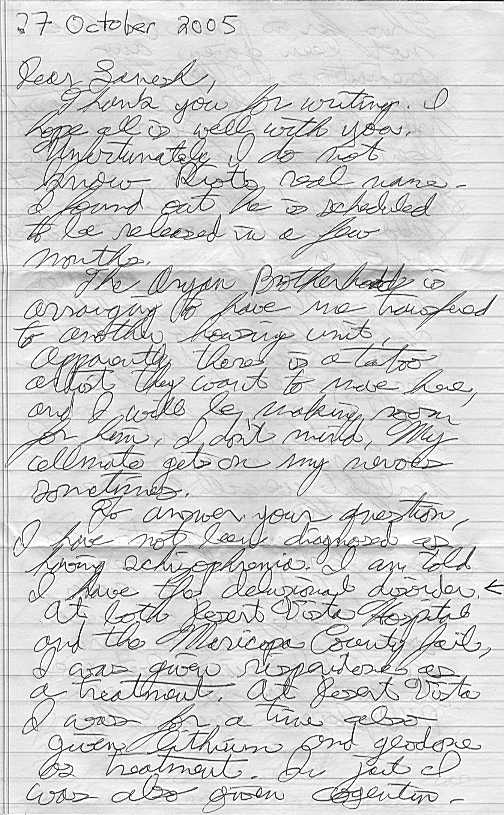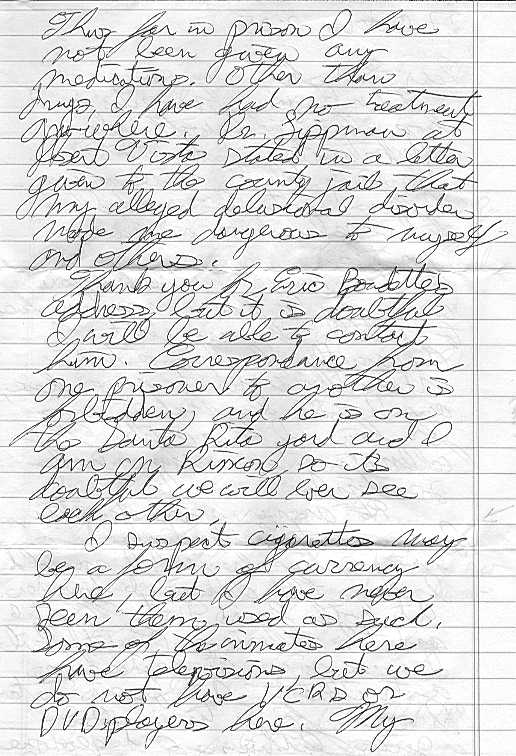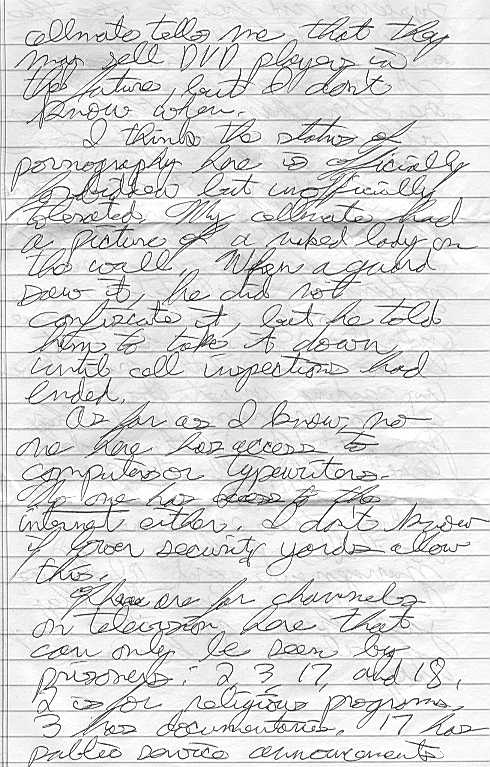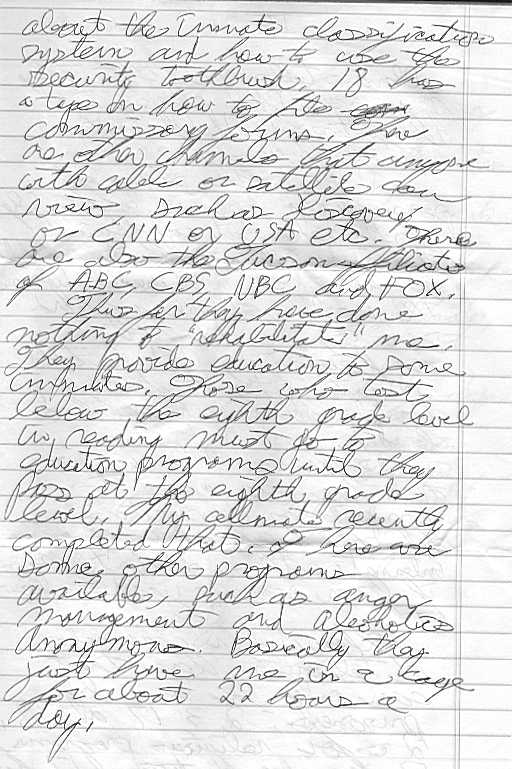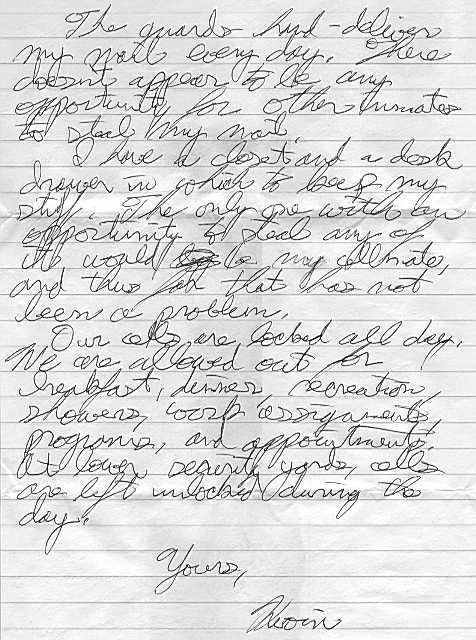Thanks for writing. I hope all is well with you. Unfortunately I do not know Riot’s real name. I found out he is scheduled to be released in a few months.
The Aryan Brotherhood is arraigning to have me transferred to another housing unit. Apparently there is a tattoo artist they want to move here, and I will be making room for him. I don’t mind. My cellmate gets on my nerves sometimes.
To answer your question, I have not been diagnosed as having schizophrenia. I am told I have the delusional disorder. At both Desert Vista Hospital and the Maricopa County Jail, I was given risperidone as a treatment. At Desert Vista I was for a time also given lithium and geodone as treatment. In jail I was also given cogentin. Thus far in prison I have not been given any medications. Other than drugs, I have had no treatment anywhere. Dr. Lippman at Desert Vista stated in a letter that my alleged delusional disorder made me dangerous to myself and others.
Thank you for Eric Boudette’s address but it is doubtful I will be able to contact him. Correspondence from one prisoner to another is forbidden, and he is on the Santa Rita yard and I am in Rincon, so it’s doubtful we will ever see each other.
I suspect cigarettes may be a form of currency here, but I have never seen them used as such. Some of the inmates here have televisions, but we do not have VCRs or DVD players here. My cellmate tells me that they may sell DVD players in the future, but I don’t know when.
I think the status of pornography here is officially forbidden but unofficially tolerated. My cellmate had a picture of a naked lady on the wall. When a guard saw it, he did not confiscate it, but he told him to take it down until cell inspections had ended.
As far as I know, no one here has access to computers or typewriters. No one has access to the internet either. I don’t know if lower security yards allow this.
There are four channels on television here that can be seen by prisoners: 2, 3, 17 and 18. 2 is for religious programs, 3 has documentaries. 17 has public service announcements about the inmate classifications systems and how to use the security toothbrush. 18 has a tape on how to fill out commissary forms. There are other channels that anyone with cable or satellite can view, such as Discovery or CNN or USA etc. There are also the Tucson affiliates of ABC, CBS, NBC and FOX.
Thus far they have done nothing to “rehabilitate” me. They provide education to some inmates. Those who test below the eight grade level in reading must go to education programs until they pass at the eight grade level. My cellmate recently completed that. There are some other programs available, such as anger management, and Alcoholics Anonymous. Basically they just have me in a cage for about 22 hours a day.
The guards hand-deliver my mail every day. There doesn’t appear to be any opportunity for other inmates to steal my mail.
I have a closet and a desk drawer in which to keep my stuff. The only one with an opportunity to steal any of it would be my cellmate, and that has not been a problem.
Our cells are locked all day. We are allowed out for breakfast, dinner, recreation, showers, and work assignments. At lower security yards, cells are left unlocked during the day.
Since Kevin mentions the reason they said he was crazy I created the blurb on his alleged mental illness.
Schizophrenia is a broad mental illness that can mean anything from a person being mildly paranoid to a raving maniac with manic-depressive or bipolar illness as it’s called using the new politically correct name.
[I am given to understand that schizophrenia and the bipolar disorder are entirely
different illnesses, and I have known many bipolar people who were not "raving maniacs".
--Kevin Walsh]
At first I thought the shrinks had labeled Kevin with the illness of schizophrenia because it is a very good illness to use as a sham to lock some up with because the definitions are so vague.
And after all the shrinks were forcing Kevin to take Lithium Carbonate and Risperidone which are both drugs used to treat people with schizophrenia. Lithium Carbonate is a drug used to treat manic-depressive illness which is a severe form of schizophrenia. Risperidone is an antipsychotic agent used to for acute treatment and maintenance therapy in schizophrenia and related psychotic disorders.
Turns out that Kevin Walsh isn't crazy enough to rate being labeled a schizophrenic. In a recent letter Kevin told me that the doctors say he is ill with "delusional disorder" which means you think something is true which the doctors don't think is true. Maybe that’s because shrinks don't like to make up as big of lies as police officers do.
Of course the illness has a catch to it. If everybody believes a delusion then you don't have this illness if you also believe the delusion.
For example in modern American if you thought that Zeus was the one and only true god they could lock you up for having the mental illness of "delusional disorder" because most Americans don't believe in the Zeus myth. And of course you can change the word "Zeus" to anything you want. Try witches, warlocks, the tooth fairy, Santa Claus, Satan, little green men from outer space .......
On the other hand in modern American if you believe in Jesus Christ they couldn't lock you up for having the mental illness "delusional disorder" because 90% of the Americans believe in that myth or delusion. Because by the definition of "delusional disorder" the "Delusions must be incompatible with the culture from which the patient comes from"
In a nut shell it seems that when they say you have "delusional disorder" it means you think weird stuff that COULD be true but it’s not weird enough to accuse you of having schizophrenia. And the real cool catch in defining "delusional disorder" if a bunch of people have the same delusion that you have then you don't have the illness "delusional disorder".
Now with this definition of "delusional disorder" I'm sure ALL people who are members of the Libertarian party could be classified as having the illness because of our beliefs that "government is the cause of the problem" and that "government is NOT the solution to the problem". I guess we could also say the same for those communists and anarchists reading this who don't share the mainstream delusions about government that the Republicans and Democrats have.
Last it appears that the doctors and shrinks are treating Kevin with the wrong methods. All the web sites I visited said that drugs are very ineffective in treating the illness of "delusional disorder". Of course the only treatment Kevin has received has been drugs which he has been forced to take.
All of the web sites I visited have said the most that psychotherapy is usually the most effective help in person suffering from delusional disorder. And of course the doctors and shrinks who have jailed Kevin at the Maricopa Medical Hospital, the Maricopa County Jail, and the Arizona State Prison have given him absolutely no Psychotherapy.
Which makes me believe even more that Kevin Walsh is and was a political prisoner arrested because he doesn't like President Bush.
And I guess the bottom line is that if you believe weird stuff which the government shrinks don't believe then they can lock you up in a mental institution with the excuse that you’re crazy because you have the mental illness of "delusional disorder".
Here is some background information I grabbed off the web on what '''delusional disorder''' is and how it’s treated along with on blurb on what schizophrenia is.
If you would ask me I would say that '''delusional disorder''' is a very, very mild form of schizophrenia. But I guess the doctors say that '''delusional disorder''' isn’t even that because your brain is not physically malfunctioning like it does when you have schizophrenia (i.e. the problem of the dopamine shortage) . So if the doctors definition is correct and my definition is wrong then I would say that '''delusional disorder''' is not even a mental illness! '''delusional disorder''' is just when you believe you believe something that another person thinks is “weird stuff” and by the doctors definition the “weird stuff” you believe in isn’t believed by most of the people in your culture.
Source
'''Delusional disorder''' is a psychiatric diagnosis denoting a mental illness that involves holding one or more non-bizarre delusions in the absence of any other significant psychopathology (signs or symptoms of mental illness). In particular a person with delusional disorder has never met any other criteria for schizophrenia and does not have any marked hallucinations, although tactile (touch) or olfactory (smell) hallucinations may be present if they are related to the theme of the delusion. A person with delusional disorder can be quite functional and does not tend to show any odd or bizarre behaviour except as a direct result of the delusional belief. It is worth noting that the term paranoia was previously used in psychiatry to denote what is now called delusional disorder. The modern psychiatric use of the word paranoia is subtly different but now rarely refers to this specific diagnosis. Delusional disorder may typically be one of the following types:
- Erotomanic Type (see erotomania): delusion that another person, usually of higher status, is in love with the individual.
- Grandiose Type: delusion of inflated worth, power, knowledge, identity, or special relationship to a deity or famous person (e.g. see Jerusalem syndrome)
- Jealous Type: delusion that the individual's sexual partner is unfaithful (see delusional jealousy).
- Persecutory Type: delusion that the person (or someone to whom the person is close) is being malevolently treated in some way.
- Somatic Type: delusions that the person has some physical defect or general medical condition (for example, see delusional parasitosis).
A diagnosis of mixed type or unspecified type may also be given if the delusions fall into several or none of these categories.
See also
- Delusion
- Paranoia
- Psychosis
- Schizophrenia
Source
<SNIP;>
Delusions constitute the most conspicuous or the only clinical characteristic. They must be present for at least 3 months and be clearly personal rather than subcultural.
<SNIP;>
Source
Delusional Disorder
SYMPTOMS
This disorder is characterized by the presence of non-bizarre delusions which have persisted for at least one month. Non-bizarre delusions typically are beliefs of something occurring in a person's life which is not out of the realm of possibility. For example, the person may believe their significant other is cheating on them, that someone close to them is about to die, a friend is really a government agent, etc. All of these situations could be true or possible, but the person suffering from this disorder knows them not to be (e.g., through fact-checking, third-person confirmation, etc.).
People who have this disorder generally don't experience a marked impairment in their daily functioning in a social, occupational or other important setting. Outward behavior is not noticeably bizarre or objectively characterized as out-of-the-ordinary.
The delusions can not be better accounted for by another disorder, such as schizophrenia, which is also characterized by delusions (which are bizarre). The delusions also cannot be better accounted for by a mood disorder, if the mood disturbances have been relatively brief.
Source
Delusional Disorder
The central feature of delusional disorder (previously called paranoid disorder) is the presence of one or more false beliefs that persist for at least 1 month. Delusions tend to be nonbizarre and involve situations that could occur, such as being followed, poisoned, infected, loved at a distance, or deceived by one's spouse or lover.
Source
<SNIP;>
Prognosis and Treatment
Delusional disorder does not generally lead to severe impairment. However, the person may become progressively involved with the delusion. Most people are able to remain employed.
A good doctor-patient relationship helps in the treatment of delusional disorder. Hospitalization may be needed if the doctor believes the person is dangerous. Antipsychotic drugs are not generally used but are sometimes effective in suppressing symptoms.
(hmmmmm.... they are giving you lots of drugs and no treatment)
<SNIP;>
Source
Delusional Disorder
Treatment
Psychotherapy is usually the most effective help in person suffering from delusional disorder. The overriding important factor in this therapy is the quality of the patient/therapist relationship. Trust is a key issue, as is unconditional support. If the client believes that the therapist really does think he or she is "crazy," the therapy can terminate abruptly. Early in the therapy, it is vital not to directly challenge the delusion system or beliefs and instead to concentrate on realistic and concrete problems and goals within the person's life.
(hmmmmm.... they are giving you lots of drugs and no treatment)
Medications
Suggesting the use of medication for use in this disorder, while possibly indicated to help temporarily relieve the delusions, is usually difficult. The client may be suspicious of any professional suggesting the use of a medication and therefore this treatment approach (and successful maintenance of the individual on the medication) is problematic.
Anti-psychotic medication is the preferred medication used, though, although it is only marginally effective. There are few studies done which confirm the use of any specific medications for this disorder.
Hospitalization should be avoided at all costs, since this will usually go to reinforce the individual's distorted cognitive schema. Partial hospitalization and/or day treatment programs are preferred to help manage the individual under close supervision on a daily basis.
(hmmmmm.... seems like the idiots at the Maricopa Medical Hospital don’t know what the f*ck their doing - they are not giving you any psycho treatment but instead just doping you up)
Source
Schizophrenia
Schizophrenia is defined by the psychiatric community (with the exception of some involved in the anti-psychiatry movement) as a group of severe psychotic mental illnesses. The name means "shattered mind", referring to the thought disorders that are the characteristic symptoms of schizophrenia.
Most researchers and clinicians currently believe that the basis of schizophrenia is primarily biological and results from the malfunctioning of dopamine pathways in the brain, as evidenced by the fact that medications which alter dopamine reuptake alleviate the symptoms of schizophrenia.
Although it is commonly confused by the public with multiple personality disorder, schizophrenia has nothing to do with the manifestation of distinct multiple personalities within a person. Instead schizophrenia is a condition with a mixture of symptoms that differ from patient to patient.
<SNIP;>
Presentation (signs and symptoms)
"Positive" symptoms include hallucinations, delusions, disordered speech, and disordered thought. "Negative symptoms" include lack of affect and apathy. Paranoia, withdrawal from social interaction, religious obsessions, and delusions of grandeur and/or persecution are common.
<SNIP;>
Delusions that have been commonly accepted as being part of schizophrenia include:
- belief that he/she has power over other people's minds or that other people have power over his/her mind
- belief in being able to read other people's thoughts or that other people can read their thoughts
- belief that there are special personal messages for them in the mass media (newspapers or radio or television) ("delusions of reference")
- belief that he/she has a special link to God or indeed is God
Delusions held by schizophrenics are unshakeable and must be incompatible with the culture from which the patient comes from.
